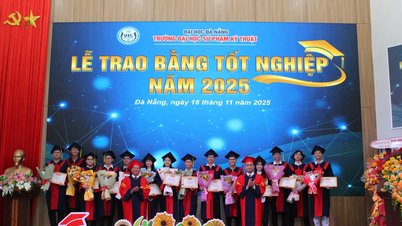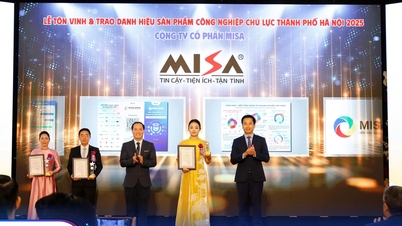The 2025 high school graduation exam questions for Math and English are attracting attention and debate among experts, teachers, students, and parents. Some say the questions are too difficult and puzzling; others support the new way of setting the questions.
In the article below, Dr. Hoang Ngoc Vinh, former Director of the Department of Vocational Education (Ministry of Education and Training), shares his perspective on the 2025 High School Graduation English exam and proposes some solutions to make the exam more effective and suitable.
After the 2025 high school graduation exam, the English exam became the center of debate. Many students and teachers said that the exam was too difficult, somewhat academic, and compared the difficulty level to the IELTS exam. In the recent article Comparing the English graduation exam with the IELTS exam is lame, an English teacher said that the comparison was "lame" and affirmed that the exam was a "correct" "shock" to the whole system.
The things I discuss below are presented from the perspective of an education policy maker, not to criticize individuals or deny the efforts of creating the questions, but to add another perspective, because the common goal is a fair, transparent exam, in line with the educational philosophy we are aiming for.
 |
| Candidates after the final exam (according to the 2018 General Education Program) in the 2025 High School Graduation Exam. Photo: The Bang |
Comparing English with IELTS is not "lame" if the nature of the test is academic.
Some argue that the graduation exam should not be compared with IELTS because the two exams serve different purposes. However, if the graduation exam is described as a highly differentiated, selective exam, then comparing it with an international academic exam like IELTS is no longer inappropriate, but completely reasonable for reference and evaluation.
What needs to be considered is not the name of the exam, but the nature of the ability that the test is testing. A test that requires extremely fast reading speed, processing a dense amount of information in a short time (40 questions/50 minutes), using a lot of academic vocabulary and complex context - then comparing it with the IELTS Reading test is completely reasonable. And if a student with a 7.0 IELTS score still finds it difficult with the graduation exam, we need to ask the question: Does the test still accurately reflect the output standards of the general education program or has it exceeded that threshold?
A national exam should not “teach a lesson” by confusing students.
It is essential to encourage real learning, combat the disease of achievement and improve English teaching and learning. However, a test that is too difficult and shocking should not be the tool to create a change. Education needs a roadmap of movements, not shocks – especially when the ones directly affected are the students.
If the program does not ensure enough time and quality for teaching and learning in-depth reading skills; if the gap between urban and rural areas in learning English is still large; if textbooks do not provide enough types of materials like exam questions - then suddenly increasing the difficulty will create a feeling of puzzlement, instead of encouraging students to study seriously.
 |
| Candidates in Ho Chi Minh City participate in the 2025 high school graduation exam. Photo: Nguyen Hue |
A graduation exam cannot have the mindset of a “selection” exam while there is no official transition roadmap and no preparation for students. The shift in assessment needs to go hand in hand with synchronous reforms in the curriculum, teaching methods, learning materials, and especially clear and consistent pedagogical communication from the beginning.
Similar structure does not mean similar level
In the article, the author argues that the exam questions are not surprising because they closely follow the published sample questions. However, the important thing is not only the technical structure (including vocabulary questions, reading comprehension questions, etc.), but also the actual difficulty level of each section. “Unfamiliar” vocabulary, abstract topics, long texts and academic thinking requirements make many students - even though they practice according to the old structure - feel helpless.
If the test creates a feeling of “deviation” from what has been learned, no matter how similar the structure is, students will still be shocked and negatively affect their ability to do the test. And that is a serious problem in terms of educational assessment, when the test no longer truly reflects the learning journey of the learner.
We are lacking data on test standardization.
To date, the Ministry of Education and Training has not released any information about the test testing process, difficulty, discrimination, reliability, or other important technical indicators. Meanwhile, in countries with serious testing systems, all tests must be tested, data analyzed, and standardized according to educational measurement criteria. Even IELTS - a commercial test - is periodically verified through data from millions of candidates.
We cannot affirm that a test is reasonable just because it is “similar to the sample test” or “has a different score spectrum”. Differentiation in scores may come from an unreasonable level of difficulty - but it does not mean that it accurately assesses students' abilities.
A national exam needs to be fair, not a shock.
The high school graduation exam is a general exam, both for graduation and as a basis for admission. When there is no clear direction to separate these two goals, the exam needs to ensure a dual principle: accurately reflect the curriculum, and at the same time have a reasonable classification threshold, easy to understand, easy to prepare. A good exam must make good students feel challenged, but average students also have the opportunity to show off instead of being eliminated from the "game" because of reading comprehension passages like in a specialized academic exam.
I agree with Mr. Triet's enthusiasm for changing the way English is taught and learned. But I believe that sustainable change cannot begin with a shocking test that lacks standardized evidence and can make students lose faith in their own learning efforts. Education needs to lead, not shock. And the national exam - at a systemic level - needs to be designed on a transparent, scientific , humane, and fair basis. The Ministry of Education and Training really needs test makers with certified professional qualifications.
Original link: https://vietnamnet.vn/tu-de-thi-tieng-anh-tot-nghiep-thpt-2025-giao-duc-can-chuyen-dong-co-lo-trinh-2416415.html?
Source: https://tienphong.vn/de-thi-tieng-anh-giao-duc-can-nhung-chuyen-dong-co-lo-trinh-khong-phai-la-cu-soc-post1756063.tpo






![[Photo] General Secretary To Lam receives Vice President of Luxshare-ICT Group (China)](https://vphoto.vietnam.vn/thumb/1200x675/vietnam/resource/IMAGE/2025/11/15/1763211137119_a1-bnd-7809-8939-jpg.webp)
![[Photo] Prime Minister Pham Minh Chinh meets with representatives of outstanding teachers](https://vphoto.vietnam.vn/thumb/1200x675/vietnam/resource/IMAGE/2025/11/15/1763215934276_dsc-0578-jpg.webp)








































































































Comment (0)